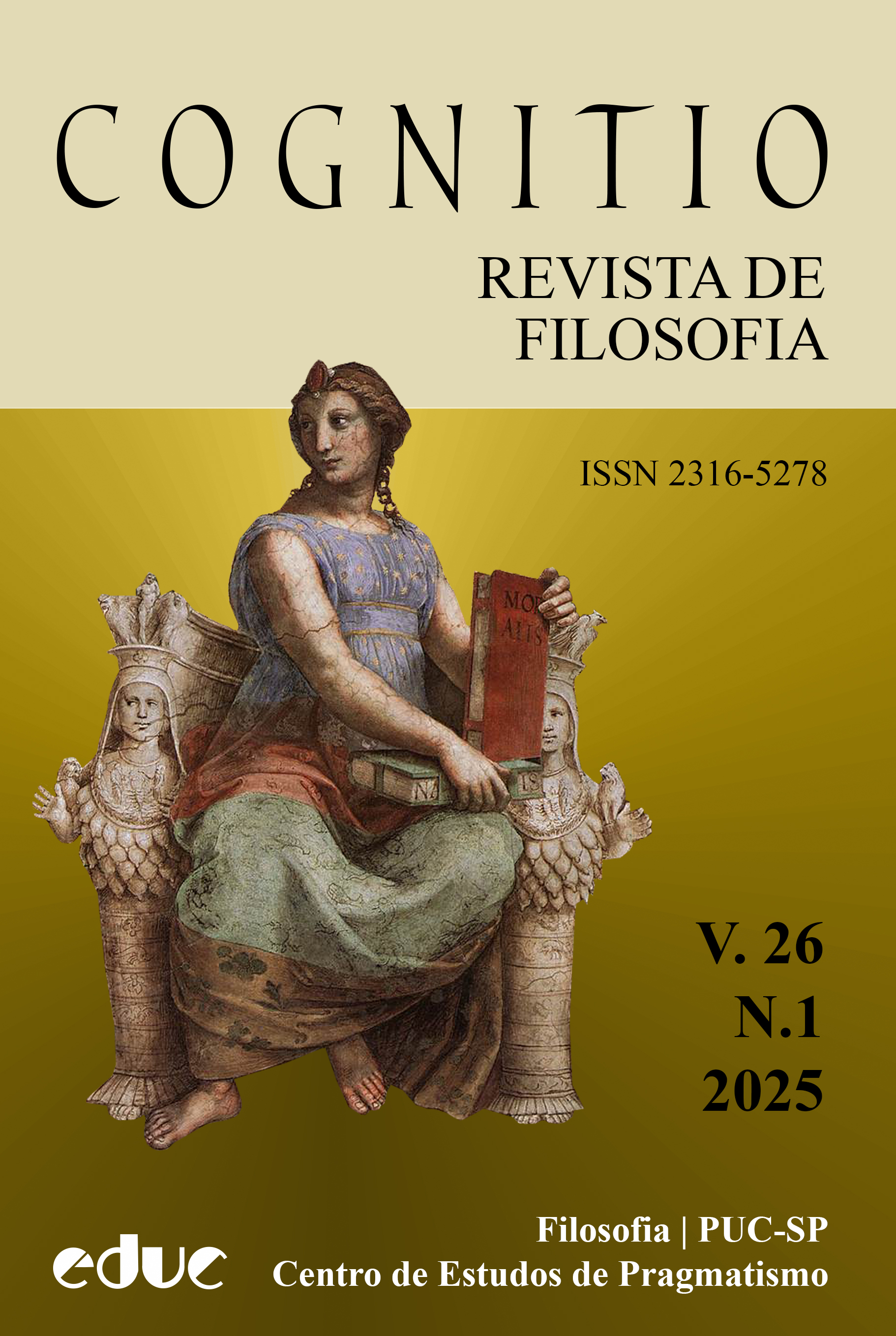Afastando-se da base pragmática da inteligência natural
Palavras-chave:
Base pragmática, Grafos existenciais, Hawkins, Inteligência natural, Neocórtex, Peirce, SemioseResumo
Estamos no vestíbulo de uma era em que a Inteligência Artificial parece destinada não apenas a gerenciar, mas a governar o fluxo e o uso da informação. Como o impacto sobre a vida e a cultura humanas certamente será profundo, é imperativo que a concepção de inteligência que orienta a IA seja compatível com a inteligência humana. O neurocientista e desenvolvedor de IA Jeffrey Hawkins está convencido de que a IA está trilhando um caminho errado ao se basear em modelos de linguagem de grande escala (big data), e que, para alcançar a Inteligência Artificial Geral (AGI), objetivo quase universal dos desenvolvedores de IA, é necessário adotar uma abordagem inspirada biologicamente. Ele desenvolveu uma nova e promissora teoria natural da inteligência baseada no funcionamento do neocórtex humano, mas descarta os processos do cérebro mais antigo como em grande parte desnecessários e contraproducentes para uma IA pós-darwiniana. A concepção naturalista de inteligência desenvolvida pelos pragmatistas clássicos há um século e meio oferece um arcabouço teórico mais rico, que situa os agentes inteligentes em ambientes interativos, o terreno pragmático da inteligência natural. Peirce, em particular, com sua busca ao longo da vida para compreender profundamente como o conhecimento pode ser extraído da experiência, desenvolveu teorias da percepção, formação de crenças, semiose e lógica cognitiva, que, tomadas em conjunto, constituem a base para uma teoria abrangente da inteligência. Essa teoria incorpora formas instintivas e emocionais de inteligência e permite um espaço conceitual no qual o pensamento pode se concentrar em preocupações e interesses teóricos, normativos e estéticos complexos. Essa concepção pragmatista da inteligência, da mentalidade em geral, é necessária para compreender as limitações e os riscos da IA em sua corrida rumo à AGI.Referências
BERNSTEIN, Richard J. Pragmatic Naturalism: John Dewey’s Living Legacy. New York: Graduate Faculty Philosophy Journal (The New School), 2020.
GATES, Bill. Is this how your brain works?. GatesNotes: The Blog of Bill Gates, Nov. 22, 2021.
HAWKINS, Jeffrey C. A Thousand Brains: a New Theory of Intelligence. New York: Basic Books, 2022.
HOOKWAY, Christopher. The Pragmatist Maxim and the Proof of Pragmatism. Cognitio: Revista de Filosofia, v. 6, n. 1, p. 35-42, 2005.
HOOKWAY, Christopher. The Pragmatist Maxim and the Proof of Pragmatism (2): After 1903. Cognitio: Revista de Filosofia, v. 9 n. 1, p. 57-72, 2008.
HOOKWAY, Christopher. The Pragmatist Maxim and the Proof of Pragmatism (3): Habits and interpretants. Cognitio: Revista de Filosofia, v. 12 n. 1, p. 89-104, 2011.
HOUSER, Nathan. Pragmatism and the Loss of Innocence. Cognitio: Revista de Filosofia, v. 4, n. 2, p. 197-210, 2003.
HOUSER, Nathan. The Church of Pragmatism. Semiotica, v. 178, n. 1/4, p. 105-114, 2010a. https://doi.org/10.1515/semi.2010.007
HOUSER, Nathan. The Increasing Attractiveness of Classical Pragmatism. Cognitio: Revista de Filosofia, v. 11, n. 2, p. 224-240, 2010b.
HOUSER, Nathan. Ibri’s Peirce: Poetry and Play in the Life of the Mind. In: GHIZZI, E. B.; DANTAS, L. F. N. S.; MADEIRA, M. GONZALEZ, M. E. Q; AIUB, M. (eds.). Sementes de Pragmatismo na Contemporaneidade; Homenagem a Ivo Assad Ibri. São Paulo: FiloCzar, 2018. p. 33-45.
HOUSER, Nathan. Peirce’s Ongoing Semiotic Project. In: BORGES, P. M.; FRANCO, J. O. R. (eds.). Tempo da colheita: homenagem à Lucia Santaella [Harvest time: Festschrift for Lucia Santaella. São Paulo: FiloCzar, 2023. p. 27-52.
HOUSER, Nathan. The Vicissitudes of Experience. In: DE WAAL, C. (ed.). The Oxford Handbook of Charles S. Peirce. Oxford: Oxford University Press, 2024. p. 77-93.
IBRI, Ivo A. Linking the Aesthetic and the Normative in Peirce’s Pragmaticism: A Heuristic Sketch: Charles S. Peirce Society 1016 Presidential Address. Transactions of the Charles S. Peirce Society, v. 52, n. 4, p. 598-610, 2016. https://doi.org/10.2979/trancharpeirsoc.52.4.04
ISAAC, Mike; MEYZ, Cade. OpenAI Executives Exit as C.E.O. Works to Make the Company For-Profit. The New York Times, Sept. 25, 2024.
PEIRCE, Charles S. The Essential Peirce: Selected Philosophical Writings, 2 vols: v. 1. N. Houser; C. Kloesel (eds.); v. 2. Peirce Edition Project (ed.). Bloomington: Indiana University Press, 1992-1998. Referred to as EP.
PEIRCE, Charles S. Logic of the Future. Writings on Existential Graphs. 3 vols in 4. A.-V. Pietarinen (ed.). Berlin: De Gruyter, 2020-2025.
PIETARINEN, Ahti-Veikko. Comments on Hookway, ‘The Pragmatist Maxim and the Proof of Pragmatism (2): After 1903’. Cognitio: Revista de Filosofia, v. 9, n. 1, p. 85-91, 2008.
QUINE, W. V. Two Dogmas of Empiricism. The Philosophical Review, v. 60, n. 1. p. 20-43, 1951. https://doi.org/10.2307/2181906
QUINE, W. V. The Pragmatists’ Place in Empiricism. In: MULVANEY, R. J.; ZELTNER, P. M. (eds.). Pragmatism, its Sources and Prospects. Columbia, SC: University of South Carolina Press, 1981. p. 21-39.
QUINE, W. V. From Stimulus to Science. Cambridge: Harvard University Press, 1995.
VEBLEN, Thorstein. The Theory of the Leisure Class. New York: MacMillan, 1899.
Downloads
Publicado
Edição
Seção
Licença
Copyright (c) 2025 http://creativecommons.org/licenses/by/4.0/

Este trabalho está licenciado sob uma licença Creative Commons Attribution 4.0 International License.



